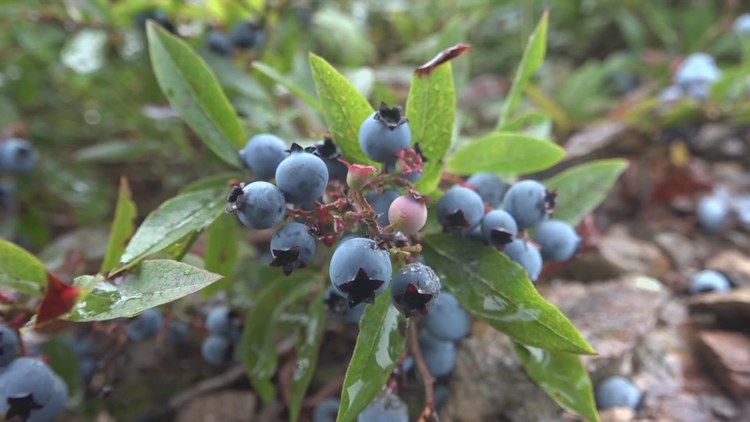ORLAND, Maine — The Wild Blueberry Commission of Maine has received more than $15 million from the USDA’s Natural Resources Conservation Service to make Maine’s wild blueberry crops more resilient to climate change.
Maine produces nearly 100 percent of the nation’s wild blueberries, which generates hundreds of millions of dollars each year. But as climate change brings more extreme weather, blueberry growers say they're feeling its effects.
“The last couple of years, weather conditions have been kind of the telltale of what the blueberry crop is going to be,” blueberry grower Simeon Allen, who is based out of Orland, said.
From severe droughts to excessive rainfall, wild blueberry producers are seeing dramatic fluctuations in harvests.
Three years ago, Allen faced one of the worst droughts of his career. This year, he struggled with too much moisture.
“The berries weren’t as tough as we’re used to seeing,” he said. “Usually we’re harvesting blueberries into September, and this year we were done Aug. 21.”
The Wild Blueberry Commission of Maine reports seeing this trend play out statewide.
“This inconsistency, this instability of supply, makes it very challenging for producers to maintain the market that they need for economic stability in the industry,” Executive Director Eric Venturini said.
As the climate becomes more extreme, experts expect to see more impacts on crops like wild blueberries.
“Those conditions are absolutely stressful to wild blueberry plants and all crops, so we are concerned about that in the future,” Dr. Rachel Schattman, assistant professor of sustainable agriculture at the University of Maine, said.
The Wild Blueberry Commission of Maine plans to use the federal funds to implement irrigation and mulching techniques across several blueberry farms in the state.
“These are really necessary adaptations that are needed to support the long-term sustainability of Maine’s wild blueberry industry, which is one of the world’s most unique cropping systems out there,” Venturini said.
Mulching helps conserve soil moisture. This and irrigation can help wild blueberry producers adapt to drought conditions.
“Irrigation can really help fill in those gaps when there's not enough rain to keep a nice, consistent soil water level,” Schattman said.
For growers like Allen, irrigation could make a big difference in crop yield and stability.
“Irrigation could definitely help in the future, you know, holding onto that crop so we don’t lose it,” Allen said.
However, the installation costs are high. And for Allen’s business, with 40 different fields, it would be complicated.
With more than 500 wild blueberry farms in the state, he said more funding will be needed to help the industry adapt.
“This is probably just the tip of the iceberg, really,” he said.
“Hopefully we can keep sustaining good, sustainable crops that can keep everyone growing blueberries in Maine," Allen said of the resiliency and efficiency plans.
By investing in these resilience strategies, the Wild Blueberry Commission of Maine hopes to secure the future of Maine’s iconic wild blueberry industry.



